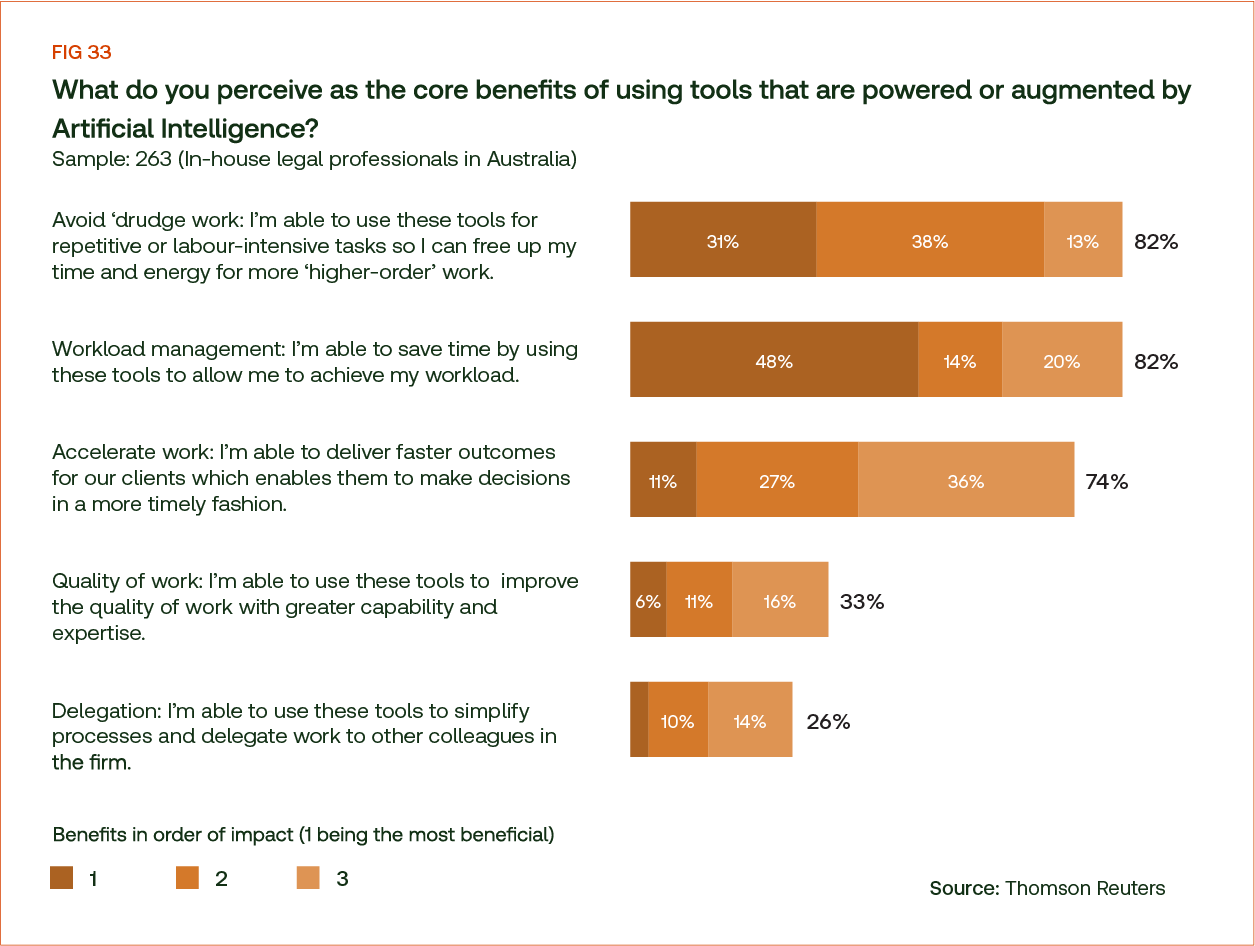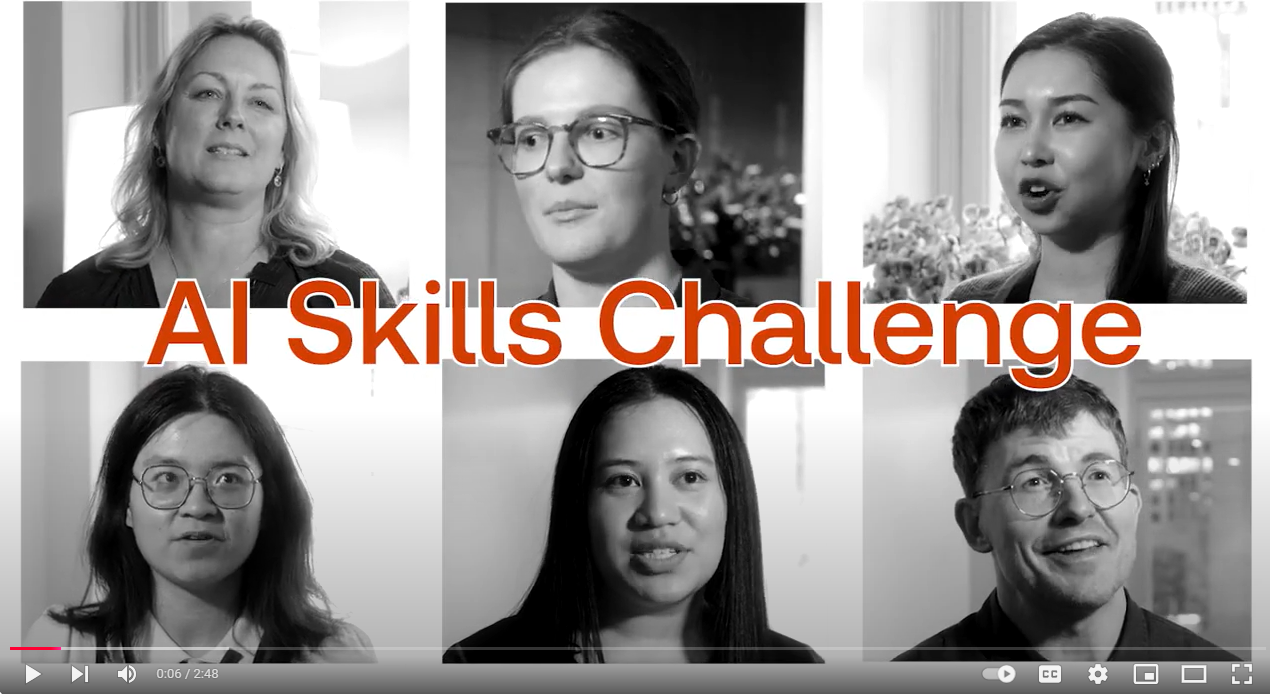The new value that Australian legal departments will deliver in 2025
Advances in legal technology are revolutionising the future of Australian legal departments. No longer will in-house counsel be required to spend countless hours on tedious drudge work and matter management. AI-powered legal tech is creating unprecedented opportunities for in-house counsel to manage their workloads better and to focus on doing what they do best. It is enabling legal teams to expand their skill sets in exciting new areas that better support stakeholder needs. This, in turn, is empowering corporate counsel to confidently anticipate business risks and opportunities.
Legal tech trends in 2025
Australia’s top-performing legal departments are currently leveraging expert legal technology to boost productivity in important ways. They have centralised sensitive files in secure virtual systems, mapped legal workflows and automated routine tasks like contract management. They have streamlined legal operations so that in-house counsel can focus on their most important work.
These leading legal departments are now looking to take their digital transformations to the next level by adopting best-in-class Generative AI. They recognise that lawyer-tested GenAI creates opportunities for even more dramatic efficiencies, while having the necessary guardrails to manage potential data security and quality risks. The adoption of AI-powered legal tech is set to become the hottest trend in 2025 as legal departments and law firms alike seek to boost their value propositions.
GenAI legal assistants
One of the most coveted pieces of legal technology in Australia is a GenAI legal assistant. Private practitioners and in-house counsel alike rated a GenAI legal assistant among the top three types of legal technology that their organisation should adopt, Thomson Reuters research found. The two other most desired legal tech solutions are those that enable efficient document drafting and document automation.
The best GenAI legal assistant solution provides all of these capabilities and more, delivering 24/7 paralegal-level support. It can rapidly fulfil complex and high-volume tasks in areas such as document drafting, contract review, document summarisation and correspondence drafting.
View Leveraging AI: A New Advantage in Legal Work below. We recently brought together in-house lawyers from leading companies to see how well our ecosystem of AI-assisted solutions can tangibly benefit traditional legal processes.
“I was surprised by how well CoCounsel was able to draft emails,” commented Miki Prochazka, a Paralegal at PayPal Australia. “I felt like I could probably copy and paste and really only need to make minor amendments to word things in the tone that I would use. So, I think that would be a massive time saver, it's a tool that I didn't think would be so advanced.”
There are many other types of efficiencies that can be achieved through CoCounsel. “I think for me it was the ability to synthesise really large amounts of information in such a short amount of time — and it did it quite well as well,” said Helen Zhang, Legal Counsel at Sunrice. “It was fairly comprehensive, with a summary that you could tweak a little bit and then get across to your client as a final response.”
GenAI legal assistants are estimated to save in-house counsel up to four hours a week in the next year, and up to 12 hours a week within the next five years. This means that each in-house counsel could save approximately 200 working hours a year.
Legal research platforms with AI superpowers
Australian legal departments are also coveting AI-powered legal know-how solutions. Traditional desk research is often painstaking, labour intensive and time consuming. This can lead to challenges in case development, disadvantages in high-stakes negotiations and delays in matter completion. Gaps in legal know-how can make or break deals and cases, and lead to costly long-term outcomes for clients.
Just over a third (34%) of Australian legal departments are currently using legal research platforms, according to Thomson Reuters research. This is set to increase exponentially in 2025 as more and more general counsel make successful business cases for solutions that incorporate GenAI.
Cutting-edge legal research platforms combine expert know-how with GenAI finesse. They enable lawyers to get the right information, faster, and to provide clients with clear answers to complex legal questions.
Many lawyers are excited about the potential to transform legal research with these technological innovations. More than three quarters (77%) of Australian law firm professionals expect GenAI to have a positive impact on legal research, according to Thomson Reuters research. Corporate counsel who have tested AI-powered know-how solutions have been impressed by the efficiencies and business benefits that can be achieved in cross-jurisdictional legal research.
“We're already using Practical Law and it's very useful for us because we work in 25 jurisdictions overseas. So having access to the knowledge overseas especially is really helping us reduce costs and capacity in-house,” commented Katrin O’Sullivan, General Counsel at The Fred Hollows Foundation. “They're very excited about the AI function and being able to ask more specific questions and get to the point more quickly.”
A Thomson Reuters survey of 263 Australian in-house counsel identified that the overwhelming majority expect AI-powered legal tech to deliver dramatic new efficiencies.
More than four fifths (82%) rated avoiding drudge work and managing workloads as the top two benefits of the technology.
Nearly three quarters (74%) also expect the solutions will enable them to deliver faster outcomes to clients, which in turn will improve stakeholder decision making. Other key highlighted benefits include enhancing the quality of work (33%) and strengthening delegation of tasks (26%).

Source: Thomson Reuters, Tech, AI and the Law 2024, Australian Edition.
Roderick Smith, Senior Legal Counsel at Novartis, was impressed by how the integration of GenAI into Westlaw enables the delivery of rapid and precise Australian legal know-how. “To see it returning answers that are not only familiar with the legislation, but also addressing my question directly, was quite amazing to see. It showed me how a tool like that could potentially return on its investment almost within the first question,” he said. “To have that as a part of the toolkit would just be amazing for any in-house counsel."
The future of tech-powered lawyers
In 2025, the most advanced legal departments in Australia will utilise AI-powered legal technology to achieve substantial efficiencies in a wide range of work. They will leverage the solutions to streamline legal workflows, turbo-boost legal research, draft contract clauses, analyse documents, seamlessly update stakeholders on work in progress, and much more. These efficiencies will enable corporate counsel to focus on more business-critical and value-enhancing work. It will empower them to prioritise the delivery of accelerated business insights and strategic legal advice to stakeholders.
Many in-house counsel are evaluating how best to leverage the 200 working hours a year that could be saved from adopting legal AI technology. Thomson Reuters’ survey of 250+ Australian in-house counsel found that some intend to use this time to:
- boost innovation;
- strengthen high-level strategic planning;
- deepen understanding of stakeholder needs;
- increase alignment with strategic business units;
- bring more work in-house.
As the contributions of in-house counsel to business success become more visible and recognised, this will invariably lead to senior executives positively reappraising the value propositions of their legal departments. This will lead to new opportunities for corporate counsel to upskill as they transform their roles and become valued partners to the business.
But, which skills and attributes will be most needed in legal departments of the future? Thomson Reuters research found that those rated as critical by Australian in-house counsel include:
- leadership skills;
- interpersonal skills;
- communication skills;
- the ability to influence stakeholders;
- tech awareness and readiness;
- AI competency;
- commercial acumen;
- a deep understanding of the business;
- agile mindsets;
- multitasking skills;
- risk awareness and adaptability;
- change management skills; and
- positive mindsets.
Top legal priorities in 2025
It is clear that the future of legal departments is deeply connected to technological innovation and having a growth mindset. The latest legal AI tools empower corporate counsel to speedily give stakeholders strategic advice on the risks, benefits and opportunities posed by new business ventures. Adoption of trusted legal solutions will enable businesses to more rapidly respond to market demand and avoid costly mistakes that may fall foul of evolving regulatory requirements.
As new advances in legal tech emerge and drive even greater efficiencies, Australian corporate counsel will develop enhanced capabilities and deliver even more outstanding legal services. Value generation will become the key motivator as in-house counsel increasingly align themselves with evolving business needs and become strategic business partners.
To learn more about how you can make legal tech work for you, book a consultation with our experts and see what your day might look like with the right tech stack.
